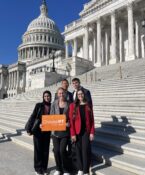Study shows alcohol intoxication, driving intention linked to genes
A recent study published in Addiction Biology revealed that a greater risk of becoming highly intoxicated and driving after drinking may be in your genes. Dennis Thombs, PhD, chair and professor of Social and Behavioral Sciences at the UNT Health Science Center’s School of Public Health, analyzed data collected via nighttime, sidewalk interviews and questionnaires, and biological tests.
The 5-HTTLPR genetic marker is commonly reported in three forms based on allele length: L/L (two long alleles), S/L (one long and one short allele), and S/S (two short alleles). An allele is one of two or more forms of the DNA sequence of a particular gene. Most research has shown that the S/S type is associated with psychological distress and problem behavior. Approximately 20 percent of the general population has the S/S trait.
Thombs conducted the study in a bar district of a large college campus community that included seven establishments that served alcohol after 10 p.m. Anonymous data and saliva samples were collected after 10 p.m. during four nights in July and August 2007 as patrons exited one of the drinking establishments. Results showed that bar patrons with the S/S genotype were three times more likely to intend to drive a motor vehicle after leaving the bar than those patrons with the L/L genotype. These findings align with previous research that associates this genetic marker with impulsivity and a lower regard for rules.
“Certainly, genetic traits do not mandate that a person drinks heavily or drives after drinking, but the results suggest these issues may be more complicated than being a matter of knowing right and wrong,” Thombs said. “The findings may also be important to explaining the major public safety problem involving persistent DUI offenders – those thousands of persons that keep offending again and again despite being convicted.”





Social media